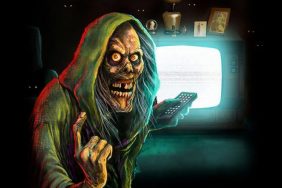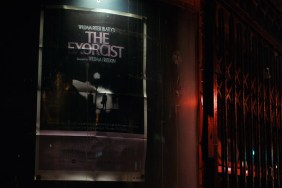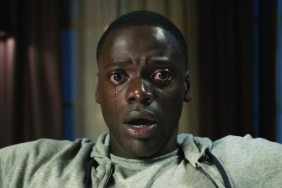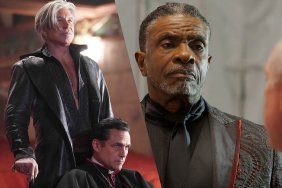
Black horror films may amount to only a few among many, but theres more than enough to look into as a legit subgenre.
They are commonly executed with similar themes and arguably firm objectives, including Black community issues and Black character subjectivity. Its perhaps more fitting to reference Horror Noire author Dr. Robin Means Colemans definition that I detail in a previous essay (Black Horror Films vs. Blacks in Horror Films). Black Horror films see filmmakers of color with an investment in narratives that centralize Black characters in extreme circumstances predicated on fear, alongside sociopolitical themes that disproportionately impact the Black community. Both entertaining and introspective, Black Horror films serve dual objectives as they often find unique ways of telling familiar stories.
Below are ten Black Horror films vital to anyones introduction to the branch on this old, weathered Gothic tree of a genre.
—
Ashlee Blackwell is the founder and managing editor of Graveyard Shift Sisters, an engaging celebration of Black women in the horror and science fiction genres. She currently resides in Philadelphia.
10 Black Horror Films
Ashlee Blackwell considers ten films essential to Black Horror
-
10 Black Horror Films #1

Son Of Ingagi (1940)
Screenwriter and actor Clarence Williams had one goal in mind as a filmmaker: a film that elevated the image of African Americans during a time of great resistance by Hollywood in doing so. Not to be entirely entangled with the appalling “documentary” that suggested African women breed with apes titled Ingagi from a decade earlier, Son was an exercise in centering Black characters, men and women, as scientists, lawyers, and interestingly, shows the vital communal structure to the Black community pre-1960s Civil Rights Movement. Son could be read as a creature feature where Dr. Helen Jackson (Laura Bowman) keeps an ape/human hybrid in her home that eventually becomes brutish and homicidal. Heralded as the first Black horror/sci-fi film, Son Of Ingagi is a solid first in early cinema.
-
10 Black Horror Films #2

The Blood Of Jesus (1941)
In step with Ingagi’s successful execution of holistic portrayals of African American characters, Spencer Williams came back the following year with a directorial debut and supernatural morality script that positioned Martha (Catherine Caviness), a devout Baptist woman in between dimensions after her non-religious husband (played by Williams) fatally shoots her accidentally while out hunting. The devil takes her on a tempting journey through the glamorous city life where her faith is tested. The plot may not be entirely captivating but for the 1940s and a strict industry “Code” that all filmmakers were dependent upon, The Blood Of Jesus remains among a revolutionary few horror films, even to this day, to have both a Black director and a central Black female protagonist that is fully developed.
-
10 Black Horror Films #3

Blacula (1972)
If you can find enough quirky appreciation to move past taglines such as “His bite was outta sight!” and “Dracula’s Soul Brother,” Blacula is more than likely, both the textbook definition of Blaxploitation horror and also one of the best. Veteran actor William Marshall plays the title role as a fallen African prince-turned-vampire who awakens in 1970s Los Angeles and finds himself in pursuit of Tina (Vonetta McGee) a dead ringer for his long lost wife, Princess Luva. With a Black director (William Crain) and Marshall’s behind the scenes imprint on creating a thoughtful character with a meaningful backstory, Blacula became more than cheap exploitation fare, capturing fictional truths of the slave trade with inter-workings of a love story mixed with 70s funk, style, and horror storytelling foundations.
-
10 Black Horror Films #4

Scream Blacula Scream (1973)
High off the coattails of a successful predecessor, Scream Blacula Scream is Blacula’s worthy sequel, which gives Marshall’s character a true chance at redemption. Scream enhances Blacula’s story as a contemporary tragic monster with twinkles of the Gothic horror icons of the 1930s. He confronts his disgust with the treatment of Black men towards Black women in one scene—gaining the affection of Lisa (played by the incomparable Pam Grier), the key to breaking the curse of his vampirism—and building a vampire army in another. Scream balances solid character development with more suspense and special effects sequences made delightful by Grier, Marshall… oh, and the time period.
-
10 Black Horror Films #5

Ganja and Hess (1973)
Rogue visionary Bill Gunn wrote and directed a movie that his producers saw as unsatisfactorily contrary to their potential cash-in on the Blaxploitation craze. Refusing to make a simplistic “Black vampire film,” Gunn executed a piece that invites an audience into the intimate domain of blood imbibing as a metaphor for addiction alongside other themes such as love, sex, class, desire, and more. Dr. Hess Green and Ganja Meda (played by Night Of The Living Dead’s Duane Jones and cult cinema unsung icon Marlene Clark, respectively) demonstrate performances so nuanced and decadent, that in a perfect world both would’ve been prime Oscar contenders. Ganja & Hess went on to become the critics’ choice at the 1973 Cannes Film Festival but ultimately tanked in the US, going through the ringer of massive editing and alternative titles such as Blood Couple and Double Possession. Fortunately, the film has seen a slight resurgence as the original director’s cut has been restored for future generations to enjoy. Ganja & Hess is unconventional and well worth a viewing.
-
10 Black Horror Films #6

Sugar Hill (1974)
A fantastic supernatural revenge film that centers Diana ‘Sugar’ Hill (Marki Bey), the protagonist who ensures greedy (mostly white) thugs get their comeuppance for killing her man. This brand of linear storytelling fun is riddled with more overt notions of “Black Power” and taking “the man” down than any other Blaxploitation horror film. In the vein of Cleopatra Jones, Coffy, and other title characters of this film genre, Bey’s Sugar represented a ‘By Any Means Necessary’ attitude with sex appeal and style that was well entangled in the celebratory, as well as problematic politics of gender at its time. Any way you see it, Sugar Hill is a righteous addition to Black horror and a standout for creating a Black female heroine.
-
10 Black Horror Films #7

Def By Temptation (1990)
Heralded by Troma Entertainment president Lloyd Kaufman as one of the “best” films produced by his company, Def By Temptation goes old-old school (in the vein of The Blood Of Jesus) as a straight forward morality tale with a modern spin. Writer and director James Bond III plays Joel, a minister-in-training from the South who travels to New York to visit his life-in-the-fast-lane brother “K” (Kadeem Hardison). Getting a taste of the nightlife, Joel runs into a beautiful woman (Cynthia Bond), one who’s actually a materialized evil spirit that’s been having her way with the men who occupy K’s neighborhood bar. Any explanation of this film really underestimates the way in which it lives up to Kaufman’s assertion. Temptation manages to be both campy and chilling, even as it tends to lean towards the very narrow dichotomy of good vs. evil. For its time, it received critical praise for being a thoughtful all-Black cast horror film removed from simplistic stereotypes and structural Hollywood trappings.
-
10 Black Horror Films #8

Tales From The Hood (1995)
Anthology horror at its finest, Tales From The Hood is a buffet, blending the horrors of reality (police brutality, gang violence, slavery, domestic abuse) with the supernatural (monsters, vengeful ghosts, “voodoo dolls”, and demons). Drawing clear inspiration from 1972’s Tales From The Crypt, Hood finds three gang members at a funeral home with Mr. Simms (Clarence Williams III), who tells them four cautionary tales about the home’s deceased inhabitants. Within the stories, Hood manages to be most terrifying and visually jarring; drawing from images in the bowels of racist American history and mae more intense by its soundtrack. With the right balance of Black aesthetics and general appeal, Hood does the job it sets out to. So much so, that this is one you wait to show kids when they’re teenagers.
-
10 Black Horror Films #9

Beloved (1998)
Originally a novel by award winning author Toni Morrison, Beloved leans toward the southern gothic. Though the film has been debated in personal and professional circles as to its “horror” label—the easily identified theme is the horrors of American slavery—Beloved brands itself with paranormal occurrences that fracture a family during the American Reconstruction period, along with the bitterness of slavery’s past literally coming back to haunt matriarch Sethe (Oprah Winfrey) in the form of the developmentally arrested ghost of her first child (Thandie Newton). Beloved is quite effective with imagery and tone and far from a comfortable watch. It forces you to consider the uniquely alternative ways horror is executed on film.
-
10 Black Horror Films #10

Bones (2001)
The quintessential contemporary Black horror film that effectively balances itself with 70s sensibilities, Bones expands the vengeful spirit narrative in ways previously unseen. Implementing a love story within a picture of the destruction of the Black community by drugs was a delicate risk for this horror film. Fortunately, it pans out well, with a nice snapshot of intraracial class conflicts to boot. Rapper Snoop Dogg’s title character is yet another sympathetic villain that suggests we look beyond his latest visceral tyranny through flashbacks. Bones is in some beats silly, but consistently remains serious enough as a genre film that delivers on nuance and great visuals due in part to director Ernest Dickerson’s background in cinematography. Even if this film isn’t your flavor, you can certainly find value in its existence.









